Routledge Philosophy GuideBook to
Hegel
on history
McCarney is a lucid and reliable guide to the complexities of Hegel's philosophy of history. He makes a substantial contribution to our understanding of Hegel's thought and its relevance to our own time.
Michael Inwood, University of Oxford
Hegel's Introduction to the Philosophy of History remains one of the most profound and influential books on the philosophy of history. This GuideBook is intended to to be used with any of the standard translations of that work. In clear and cogent terms it
- examines the ideas and arguments of the Introduction to the Philosophy of History
- explains the key concepts of Hegel's system, a knowledge of which is essential for fully understanding his philosophy of history
- assesses the continuing relevance of Hegel's work to contemporary debate about the nature of history.
Joseph McCarney is Senior Lecturer in Philosophy at South Bank University

Hume on Morality
James Baillie
Hume on Knowledge
Harold W.Noonan
Kant and theCritique of Pure Reason
Sebastian Gardner
Mill on Liberty
Jonathan Riley
Mill on Utilitarianism
Roger Crisp
Wittgenstein and thePhilosophical Investigations
Marie McGinn
Heidegger andBeing and Time
Stephen Mulhall
Plato and theRepublic
Nickolas Pappas
Locke on Government
D.A.Lloyd Thomas
Locke on Human Understanding
E.J. Lowe
Spinoza and Ethics
Genevieve Lloyd

Routledge Philosophy GuideBook to
Hegel
on history
 Joseph McCarney
Joseph McCarney
First published 2000
by Routledge
11 New Fetter Lane, London EC4P 4EE
Simultaneously published in the USA and Canada
by Routledge
29 West 35th Street, New York, NY 10001
Routledge is an imprint of the Taylor & Francis Group
This edition published in the Taylor & Francis e-Library, 2002.
2000 Joseph McCarney
All rights reserved. No part of this book may be reprinted or reproduced or utilised in any form or by any electronic, mechanical, or other means, now known or hereafter invented, including photocopying and recording, or in any information storage or retrieval system, without permission in writing from the publishers.
British Library Cataloguing in Publication Data
A catalogue record for this book is available from the British Library
Library of Congress Cataloging in Publication Data McCarney, Joe.
Hegel on history/Joseph McCarney.
p. cm. (Routledge philosophy guidebooks)
Includes bibliographical references and index.
1. HistoryPhilosphy. 2. Hegel, Georg Wilhelm Freidrich, 17701831
Contributions in philosophy of history. I. Title. II. Series.
D16.8 .M3856 2000 99059383
901dc21
ISBN 0-415-11695-3 (hb)
ISBN 0-415-11696-1 (pb)
ISBN 0-203-13673-X Master e-book ISBN
ISBN 0-203-17862-9 (Glassbook Format)
In memory of my parents
I often used to see him looking around anxiously as if in fear he might be understood. He was very fond of me, for he was sure I would never betray him. As a matter of fact, I then thought that he was very obsequious. Once when I grew impatient with him for saying: All that is, is rational, he smiled strangely and remarked, It may also be said that all that is rational must be. Then he looked about him hastily; but he was speedily reassured, for only Heinrich Beer had heard his words. It was not till later that I understood these expressions. Not till later did I understand what he meant when he declared in his Philosophy of History that Christianity represents progress because it teaches the doctrine of a God who died; while heathen gods knew nothing of death.
Heinrich Heine
Contents
3 Subject and infinite power
Acknowledgements
This book has taken a good deal longer to write than I envisaged at the start. Its publishers, and the editors of the Routledge Philosophy GuideBooks series, deserve to be thanked with more than usual warmth for their understanding and patience. More specifically, I am indebted to Jonathan Wolff for his early encouragement of the project and to Tim Crane for valuable practical criticism. I greatly benefited from comments on substantial portions of the work in progress from Chris Arthur, Andrew Chitty, Richard de Zoysa, Gregory Elliott and Tony Smith. In addition, Andrew Chitty generously made available the results of his own work in correlating the English translations of the Introduction. I am grateful to Hugh Atkinson for making it easier for me to devote time to the demands of the book. I am grateful also to Ashley Price for the professional skill and good humour with which he processed a difficult manuscript. Finally, I wish to thank my wife for her unfailing and indispensable support.
Chapter 1
Introduction
Georg Wilhelm Friedrich Hegel was born on 27 August 1770 in Stuttgart and died, of cholera, on 14 November 1831 in Berlin. He led a relatively uneventful life in an eventful time, a time of what have to be called, in the language of his philosophy of history, world historical events. In particular, there was the French Revolution and the rise and fall of Napoleon. Hegel is supposed to have hailed the first of these events as a young student by participating in the planting of a tree of liberty. Although he came to deplore, and to give in his Phenomenology of Spirit a profound analysis of, the excesses of the Revolution, he never ceased to regard it as having a positive historical significance. It always remained for him a vital moment in the realisation of human freedom, a view symbolised in his reported habit of raising a celebra-tory glass each year on the anniversary of the fall of the Bastille. Napoleon, the child of the Revolution, was to figure for Hegel as the central example in the modern world of those he terms the world historical individuals. His attitude is captured vividly in a letter that reports on the sight of the Emperor, this world-soul, riding out of the city of Jena after his victory in battle there: It is indeed a wonderful sensation to see such an individual, who, concentrated here at a single point, astride a horse, reaches out over the world and masters it (HL: 114). The note of awe and reverence is struck again when, nearly ten years later, Napoleon came to fulfil the tragic destiny characteristic of the world historical individual. It is, Hegel observes, a frightful spectacle to see a great genius destroy himself, allowing the entire mass of mediocrity to bring him down (HL: 307).
Hegel's response to such public events sheds, one might suggest, more light on his thought than do any details of his private life. This is not simply because of the uneventful nature of that life. It has also to do with the somewhat uncanny objectivity he cultivated or found natural, his determination not to allow the merely personal and particular to intrude into philosophy. With this in mind, it should suffice for the purposes of the present inquiry if the circumstance of his life are recounted in broad outline.

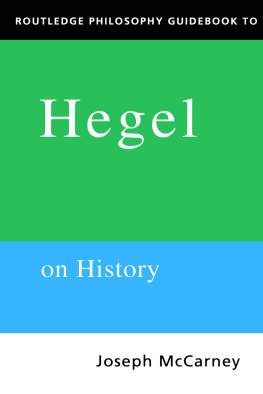
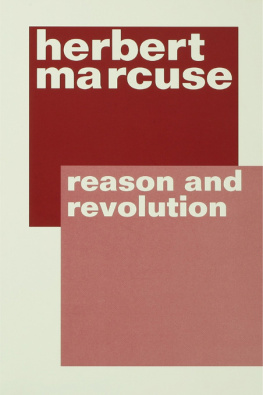

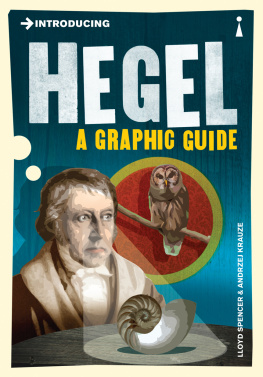
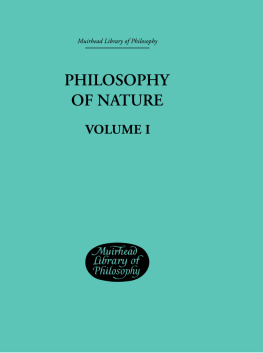
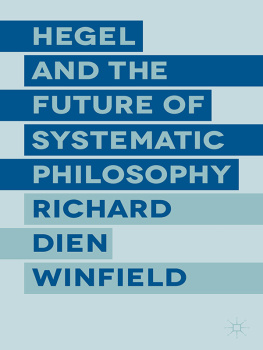

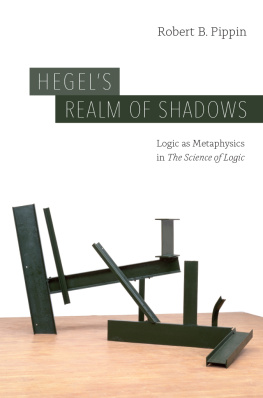

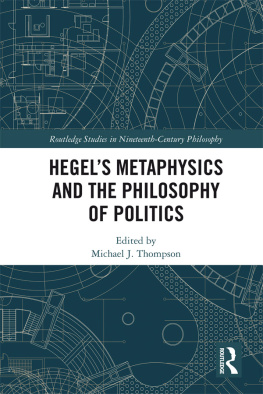
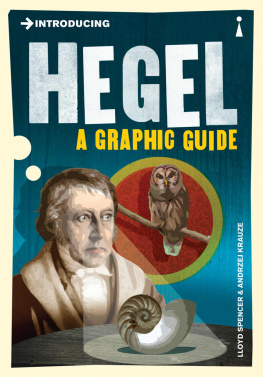




 Joseph McCarney
Joseph McCarney